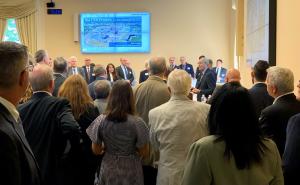Bringing the ITER Business Forum to Washington
Every second year, a two-day ITER Business Forum is held to invite existing and potential suppliers for the ITER Project—laboratories, universities, and companies large and small—to learn about upcoming opportunities to compete for contracts and to present their relevant technological capabilities. Following the IBF-19 meeting held earlier this year in Antibes, a number of those present noted the relatively light participation by US companies. Last week, the US House Science Committee invited ITER to use their chambers to hold an abbreviated "ITER US Business Forum" to bring the message to Washington.
Interest proved to be keen. Approximately 90 participants attended: from multinational powerhouse companies such Bechtel, Areva, and Skanska, to small businesses specializing in beryllium machining, robotics and remote handling, nuclear system components, and unique diagnostic instruments. Some companies present are already suppliers for the US Domestic Agency, or are at least familiar with the calls for tender issued from the US ITER Procurement Office. What was new, for nearly all concerned, were the opportunities available to compete directly for contracts with the ITER Organization.
In a brief presentation, the ITER Director-General described the status of project progress, then laid out a series of opportunities corresponding to coming areas of ITER need: control engineering, tritium systems, the Hot Cell Complex, and more. Ned Sauthoff, Head of the US ITER Project Office, spoke briefly about US procurement opportunities, and Mickey Wade, Director of Advanced Fusion Systems at General Atomics, gave his perspective on the unique value of being an industrial supplier to the project.



